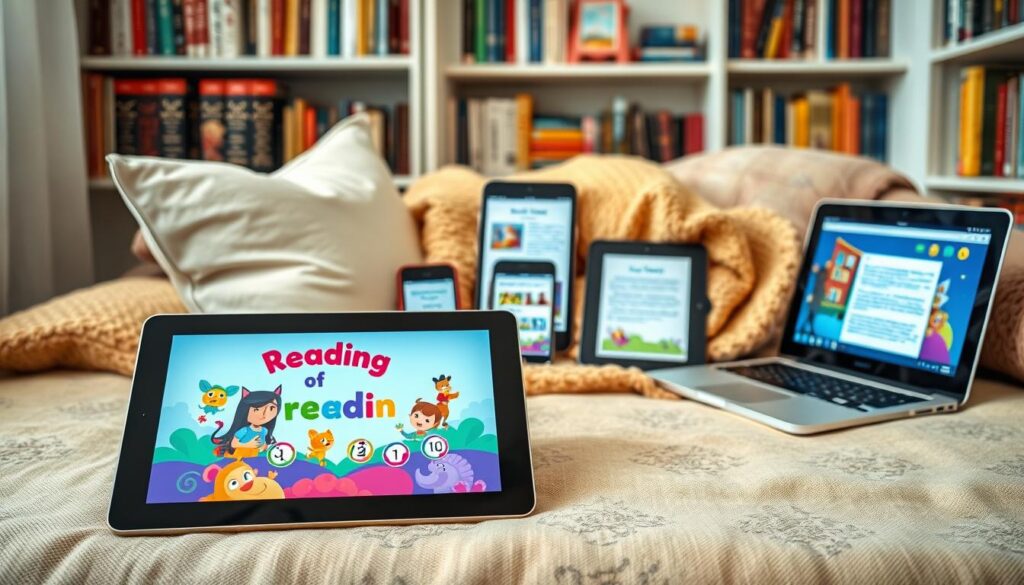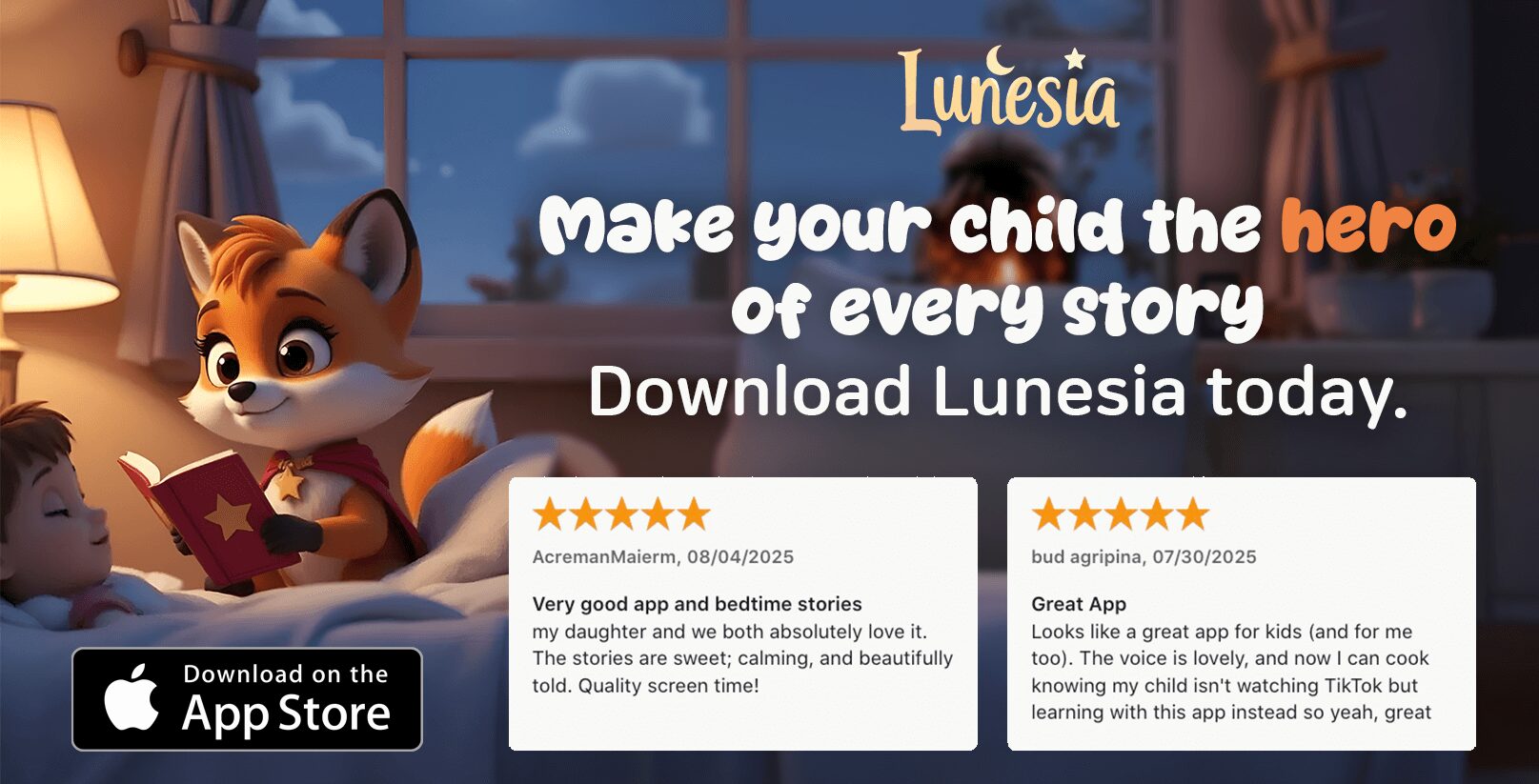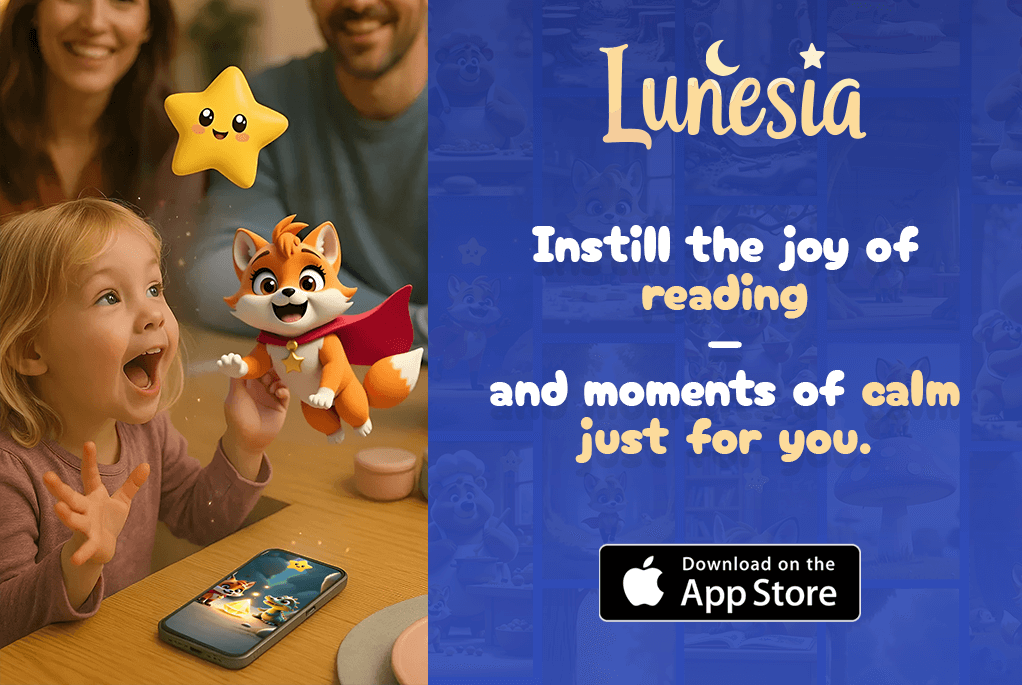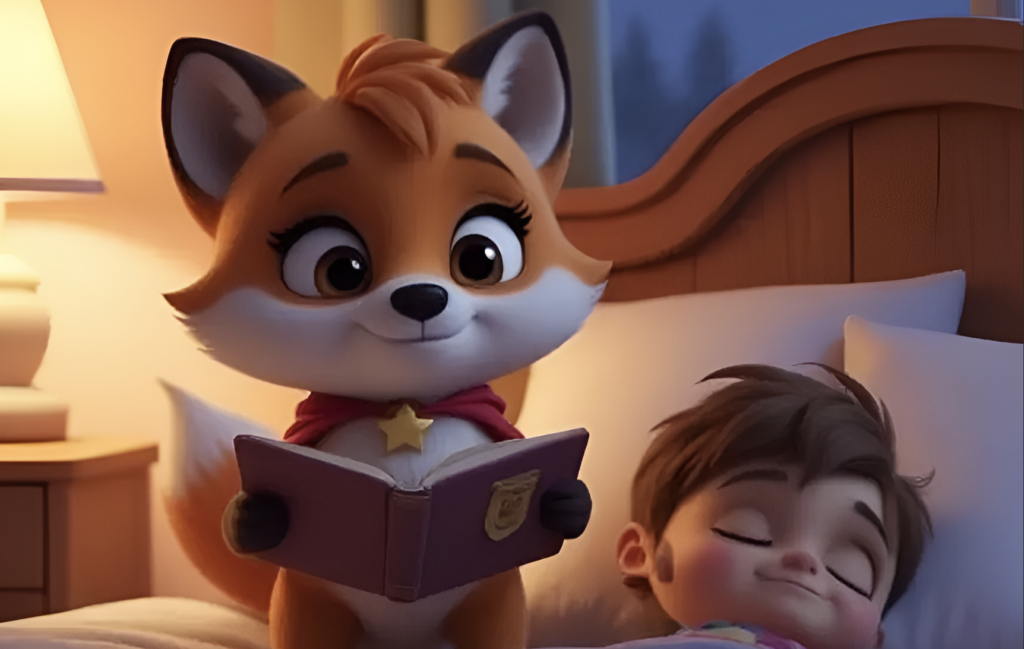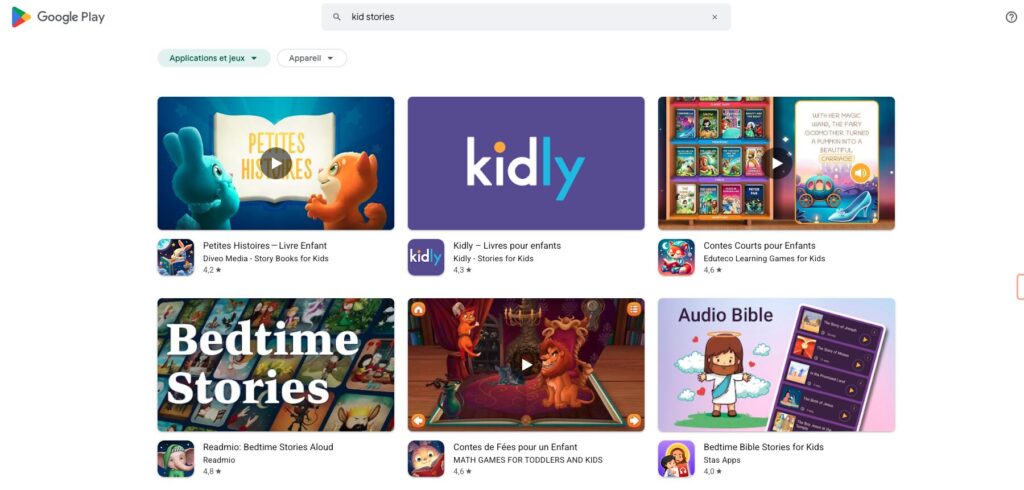As a parent, there’s nothing quite like reading with your child. It’s a special bonding time that fosters a love for books and learning. In today’s digital age, reading apps have become an essential tool for kids’ development, offering a vast digital library at your fingertips.
In this article, we’ll explore how curated digital libraries like Lunesia and Skybrary are revolutionizing the way children interact with stories. We’ll compare their content libraries, user experience, educational value, and pricing to help you make an informed decision about the best reading app for your child.
Choosing the right reading platform matters for your child’s learning outcomes. Let’s dive into the world of digital reading and discover which platform is best suited for your kid’s needs.
Understanding Digital Reading Platforms for Children
As we navigate the digital landscape for children, understanding the role of digital reading platforms becomes increasingly important. These platforms have transformed the way children interact with books and reading materials, making it a more engaging and interactive experience.
The Rise of Digital Reading Apps
The digital reading landscape has evolved significantly, with numerous apps offering a range of approaches to reading. Apps like Epic, Novel Effect, Khan Academy Kids, Little Stories, and Skybrary have become popular among both students and teachers. These digital library platforms often include features like read-aloud options and interactive elements to engage young readers.
Benefits of Curated Reading Experiences
Curated reading experiences on these platforms provide numerous benefits. They help teachers and parents guide children toward appropriate content while still giving them choice and autonomy. Research highlights the potential benefits of quality digital reading programs when used as part of a balanced approach to literacy. These platforms can track reading progress and adapt to individual readers’ needs and interests over time, making them a valuable tool in a child’s learning journey.
| Platform Features | Benefits |
|---|---|
| Read-aloud options | Enhances reading experience |
| Interactive elements | Increases reader engagement |
| Curated content | Ensures age-appropriate material |
By leveraging these digital reading platforms, we can create a more engaging and effective reading experience for children, supporting their literacy development and fostering a love for reading.
Lunesia vs Skybrary: Overview and First Impressions
Digital reading platforms like Lunesia and Skybrary are revolutionizing the way children consume books, making it easier for parents to instill a love for reading in their kids. As we dive into the world of these digital reading apps, let’s explore what sets them apart.
Lunesia: Platform Background and Mission

Lunesia is making waves in the children’s digital reading space with its curated selection of stories. By focusing on a child-centric approach, Lunesia aims to foster a love for reading in young minds. You can explore more about Lunesia on their official website at https://lunesia.app/.
Skybrary (Reading Rainbow): LeVar Burton’s Digital Library
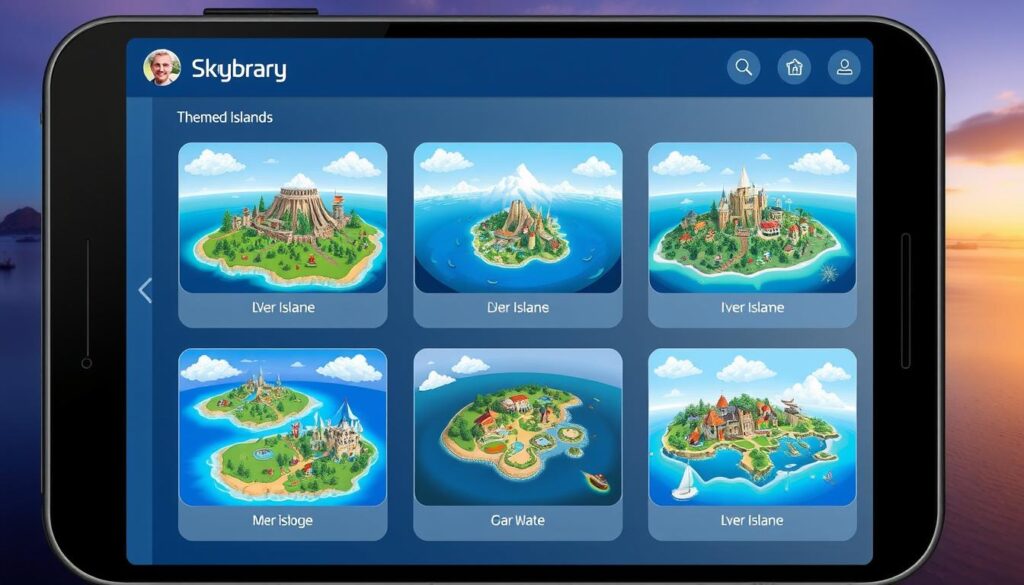
Skybrary, created by the renowned LeVar Burton, brings the beloved Reading Rainbow television program to life in a digital format. This digital library offers a vast collection of books organized into themed islands, catering to diverse interests. With a subscription model at $4.99 per month, Skybrary provides an engaging experience, encouraging children to read through a rewarding sticker system.
Both Lunesia and Skybrary offer unique approaches to promoting reading among children. While Lunesia focuses on a personalized reading experience, Skybrary leverages its rich content and interactive features to keep young readers engaged. As we compare these platforms, it becomes clear that each has its strengths, catering to different preferences and reading styles.
Content Library Comparison
As we dive into the world of digital reading for children, it’s essential to compare the content libraries of Lunesia and Skybrary. The quality and diversity of their book collections can significantly impact a child’s reading experience.
Lunesia’s Book Collection and Diversity
Lunesia boasts an impressive library of books that cater to various age ranges and interests. Their content partners and publishers play a crucial role in shaping their collection.
Content Partners and Publishers
Lunesia collaborates with renowned publishers to offer a wide range of books. This partnership ensures that their library is constantly updated with fresh content, providing kids with access to the latest stories and reading materials.
Genre and Topic Coverage
The platform covers a broad spectrum of genres and topics, making it an engaging experience for young readers. From fiction to non-fiction, Lunesia’s diverse collection ensures that there’s something for every kid, promoting a love for reading across different interests.
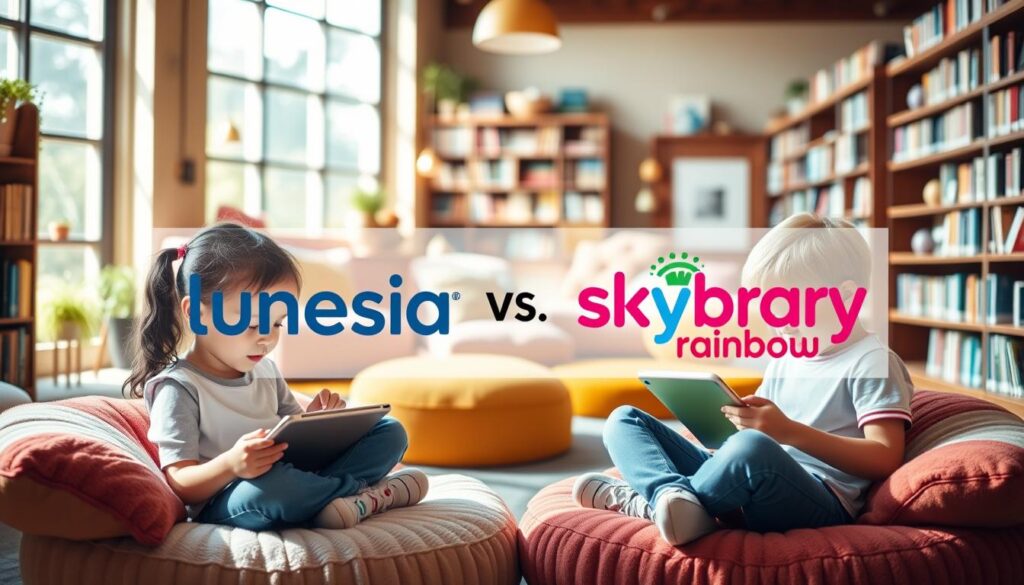
Skybrary’s Themed Islands and Selection
Skybrary, on the other hand, organizes its content into themed islands, creating an immersive experience for young readers. Their unique approach to content curation is worth exploring.
National Geographic Partnership
One of Skybrary’s standout features is its partnership with National Geographic, which brings high-quality educational content to their platform. This collaboration enhances their library with engaging non-fiction materials and videos, making it an attractive option for kids who enjoy learning through different media.
Original vs. Licensed Content
When comparing the two platforms, it’s essential to consider the balance between original and licensed content. While Skybrary relies heavily on copyright-free titles, Lunesia offers a mix of original and licensed books. This difference can impact the overall bottom line of the reading experience, affecting how engaging the platform is for a kid.
For more insights into other children’s reading apps, you can check out Lunesia’s top 10 children’s story apps for. Ultimately, the bottom line is that both platforms have their strengths and weaknesses in terms of content offerings, and the choice between them will depend on what matters most to you as a parent or educator.
Considering the bottom line impact on the reading experience, it’s clear that both Lunesia and Skybrary aim to provide engaging content for young readers. The key is finding the platform that best aligns with your child’s interests and reading preferences, ensuring they have access to a diverse and enriching library.
Educational Value and Learning Tools
When it comes to digital reading platforms, the educational value they offer is just as important as the stories they tell. As a parent or educator, you’re likely looking for more than just an engaging story – you want a tool that will help children develop their reading skills and foster a love of learning.
Lunesia’s Reading Development Approach
Lunesia’s approach to reading development is centered around a personalized learning experience. By tracking progress and providing assessment tools, Lunesia enables parents and teachers to monitor children’s growth and identify areas for improvement.
Progress Tracking and Assessment
Lunesia’s progress tracking feature allows you to see how your child is progressing through their reading journey. This information can be invaluable in identifying areas where your child may need extra support.
Parent and Teacher Resources
In addition to progress tracking, Lunesia offers a range of resources for parents and teachers. These resources are designed to support children’s reading development and provide guidance on how to extend learning beyond the app. You can explore these resources on the Lunesia website.
Skybrary’s Educational Framework
Skybrary’s educational framework is built around a comprehensive approach to literacy development. By incorporating interactive elements, quizzes, and activities, Skybrary reinforces reading comprehension and promotes a deeper understanding of the material.
Reading Comprehension Features
Skybrary’s reading comprehension features are designed to engage students and promote active learning. By incorporating quizzes and activities, Skybrary helps to reinforce understanding and build confidence in young readers.
Integration with Learning Goals
Skybrary is designed to integrate with broader learning goals and curriculum standards. This makes it an ideal tool for teachers looking to support their students’ reading development and align with school standards.
| Feature | Lunesia | Skybrary |
|---|---|---|
| Progress Tracking | Yes | Limited |
| Reading Comprehension Features | Yes | Yes |
| Integration with Learning Goals | Limited | Yes |
In conclusion, both Lunesia and Skybrary offer valuable educational tools and features that support reading development and learning. By understanding the strengths and weaknesses of each platform, you can make an informed decision about which one is best for your child or students.
Pricing, Accessibility, and Final Verdict
Let’s dive into the details that matter most to parents and educators: the cost and accessibility of Lunesia and Skybrary. Skybrary is priced at $4.99 per month, a competitive rate compared to other reading platforms like Epic, which costs $7.99 per month after a one-month trial. While Lunesia’s pricing structure isn’t explicitly stated, its value proposition lies in its curated stories and educational approach. Both platforms offer unique accessibility features, including device compatibility and offline access options.
When considering school integration, both platforms offer special programs and teacher resources. Lunesia and Skybrary are more than just reading apps; they’re comprehensive educational tools. In comparison to other popular reading apps like Novel Effect and Khan Academy Kids, which are free, or Reading Eggs, a multi-award-winning resource, Lunesia and Skybrary offer distinct value propositions.
In conclusion, the bottom line is that the best platform for you depends on your specific needs, budget, and the age group of the children. I recommend evaluating both platforms based on their pricing, accessibility, and educational content to make an informed decision.
FAQ
What is the main difference between digital reading platforms like Lunesia and Skybrary?
The main difference lies in their content library, user experience, and educational approach. While both offer curated stories, they vary in their book collections, interface, and learning tools.
Are these reading apps suitable for my child’s age group?
Both Lunesia and Skybrary cater to young readers, offering a range of stories and activities tailored to different age groups. You can check their platforms to see which one aligns better with your child’s age and reading level.
Can I try these reading platforms before committing to a subscription?
Yes, both Lunesia and Skybrary typically offer a free trial period, allowing you to explore their content, features, and user experience before deciding on a subscription.
How do these platforms support reading development and learning?
Both platforms incorporate educational tools and approaches to support reading development. Lunesia focuses on a specific reading development approach, while Skybrary uses an educational framework that includes quizzes, narration, and other interactive features.
What is the price per month for these digital libraries?
The pricing varies between Lunesia and Skybrary. You should check their official websites for the most up-to-date pricing information, as it may change over time.
Can I access these reading apps on multiple devices?
Generally, both Lunesia and Skybrary allow access on multiple devices, making it convenient for your child to read across different platforms. However, it’s best to confirm their policies on device access.
How do these platforms track my child’s progress?
Both platforms offer features to track your child’s reading progress, such as quizzes, assessments, and reading logs, helping you stay informed about their development.
